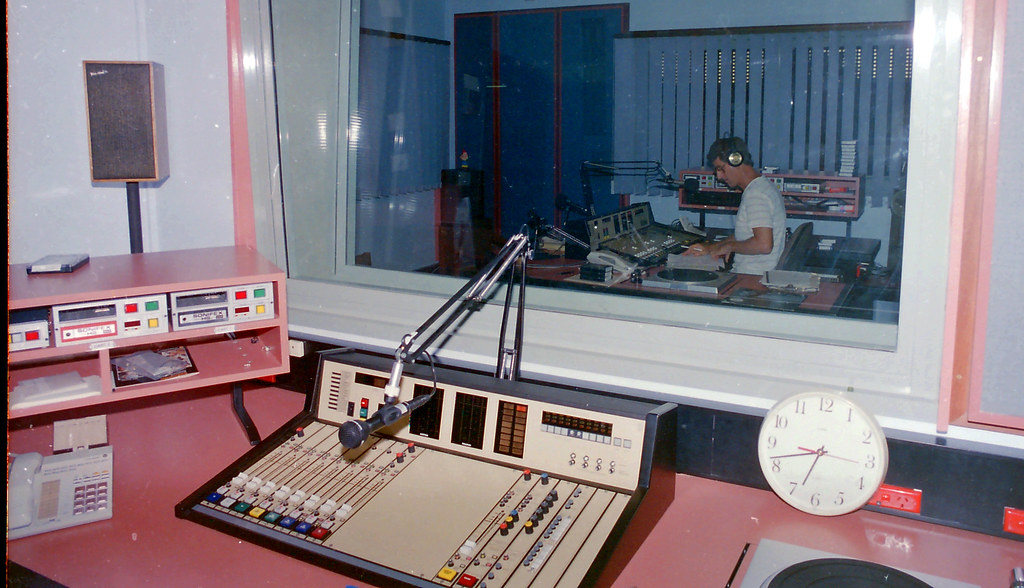Physical space in a digital world
Font | 17 June 2022
Physical space in a digital world
by Stefan Spirodon Christoff
Stefan Spirodon Christoff is a media maker, community activist and artist living in Montreal.
Community radio is a space on the airwaves and also a physical space in the city.
Twenty years of involvement at CKUT 90.3 FM clearly illustrates the essential role that community radio can play in facilitating community activism and popular education. It is important to consider the role that brick and mortar community media spaces play in building grassroots power in this historical instant of smartphones and social media dominance.
Reflecting on moments of community organizing that I have participated in at CKUT over two decades, my eyes are filled with tears and my heart with hope.
The station’s physical location on University Street stands as a place for media activists to develop tools and capacities, to create media projects that can respond to realities that have often not been thoroughly addressed in the major corporate and state-run media.
The first radio documentary that I produced for CKUT focused on the Skwelkwek’welt Protection Centre that had been established by land defenders from the Secwépemc nation. In 2003, I was invited to visit Secwépemc territory by members of the Native Youth Movement, to both document and support the frontline Indigenous protest camps established to reject the expansion of the Sunpeak ski resort onto traditional Indigenous lands.
Taking the time to visit, exchange, and interview members of the Secwépemc Nation was an immense learning opportunity and a life-changing experience. The fact that I arrived in Indigenous territory through community activist connections, after meeting members of the Native Youth Movement during a speaking tour event in Tio’tiá:ke / Montreal, meant that there was a certain level of trust and openness to start.
Returning to CKUT studios a couple months later with hours of recorded material—interviews with Indigenous elders, including the late Wolverine and Arthur Manuel—equalled an opportunity to create a rich and moving radio documentary about the Skwelkwek’welt Protection Centre.
Another collaboration that grew out of an ongoing presence and collaboration with community radio is the Fighting FTAs project, a collaboration I worked on with the late activist scholar Aziz Choudry.
In 2004, after a wave of protests took place globally to challenge the neoliberal economic policies that were represented most strongly by institutions like the IMF, World Bank, and World Trade Organization (WTO), there was a shift on the part of economic and political power away from multilateral trade policy. At CKUT radio I worked intensely on a series of interviews aiming to decode the hard realities that were involved in this shift in policy toward bilateral trade agreements.
Beyond names like the Korea-US Free Trade Agreement, or the Canada-Colombia Free Trade Agreement, or the Canada-Israel Free Trade Agreements, these accords, and the deepening of political and economic focus on such agreements, represented a major shift in policy that had tangible negative impacts on the environment, labour conditions, land rights and public institutions for communities across the world.
This major global shift in power balance in economic trade policy was not being thoroughly addressed in the mainstream media. I worked through the Fighting FTAs project to fill that gap in the context of community radio, to lift up voices that could speak to the fact that the balance of economic forces internationally was much more deeply set against nations and most importantly communities in the Global South in the critical negotiations around global trade policy.
Critically, the Fighting FTAs series was an extensive set of interviews with social movement activists, including farmers, Indigenous land defenders, workers, and activists in countries literally around the world. The interview series was distributed through the project Bilaterals.org, while also broadcast on CKUT 90.3 FM and other campus community radio stations globally.
Often I reflect on the fact that community radio spaces like CKUT 90.3 FM were always politically way ahead. I recall making broadcasts from the first Missing Justice protests, the sounds of the Buffalo Hat Singers, the collective call to action on the reality of missing and murdered Indigenous women, way before mainstream political leaders were working the mainstream media to attempt to claim that action was being taken on this issue. Likewise, the broadcasts on migrant justice and the rights of frontline essential non-status workers going back twenty years. These special broadcasts done in collaboration with the Immigrant Workers Centre and activist networks like Solidarity Across Borders.
I feel deeply that the physical radio station, the space where community media activists could gather and physically coordinate, learn skills and place alternative media coverage, has had a decisive role in reorienting the political conversation around some of the major issues of our time.
For years, and particularly during the pandemic, it has felt like the major media has been playing catch-up with the analysis, guests, and ideas that have been broadcast on community radio for decades. It is critical to cherish the alternative space that community stations like CKUT hold within society to develop analysis and lift up voices outside of the mainstream boundaries of political discourse and action.
Community radio spaces like CKUT have worked to deepen and reorient the mainstream political conversation in profound ways, slowly shifting the focus toward voices calling for transformative social change and justice. This community work within stations like CKUT is essential to expanding popular understandings of power dynamics and creating a space for critical voices to rise without the restrictive frameworks of politics that are often maintained in corporate and state-run media.






